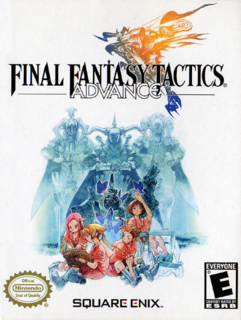A good game for a GBA user..........
This is a unique idea for a story, but it doesn't quite play out as well as one may have originally hoped. While it holds the game together pretty well, and is unlike most any other game story out there, the player is rarely ever genuinely pumped to progress in this plot. It's good, but not great. But the story isn't supposed to be the focus point of a tactical RPG anyway. Like a good TRPG, Tactics Advance drives from its battle system. Just like the original, the battle system and interface are very deep, and make the game highly addicting. Also like FFT, several job classes are available. But the twist that Advance has thrown in is the presence of different races. Mogs, humans, rabbit-like Vieras, and others all coexist as members of your party, and each race can only take on certain jobs. For example, only a moogle can become a gunner, but at the same time, moogles can not be red mages. Skills are learned in a different way than they were in the first Final Fantasy Tactics. In this new game, "AP" are earned after winning battles, and contribute to the learning of new skills. How one determines which skill to learn is through equipping different weapons and armor. Most pieces of equipment have a list of what skills they can teach to members of certain jobs (kinda similar to the Esper System from FF6). While this can create a cluttered inventory and make shopping a long chore, it is a creative system, and it adds delightfully to the aforementioned addiction factor.
History has, in a way, cursed Final Fantasy games to a certain expectation of an awesome soundtrack with every new release. While the music in Final Fantasy Tactics Advance can't compare to FF7 or even the first FF Tactics, it is certainly above the bulk of GBA games, and the CD version is surprisingly good. The sound effects and music are great in the game, and the soundtrack is decent outside of the game. The graphics are just about as good as the Game Boy Advance can produce. Final Fantasy Tactics Advance is constantly pleasing to the eye, and never will you feel that Square Enix cut a corner in the visuals budget while playing this game. My only real complaint is that the game is very easy. There aren't very many battles that present a grand challenge, and the encounters on the world map are often a joke. The fact that so many strategic approaches can be taken into battle is kind of pointless when many of them require no such strategy to come out a winner. Perhaps this was done because of the obvious increase in younger players a game experiences when put on a handheld system, but this could have been overcome by having selectable difficulty levels. To summarize, Final Fantasy Tactics Advance packs an interface almost as deep as its elder brother (though a little clunky at times), but doesn't tell quite as good of a story. The game features fun, although somewhat easy battles and isn't shy about technical achievments, and ultimately leaves the player feeling satisfied. It didn't just win our 2003 GBA Game of the Year award for nothing.

